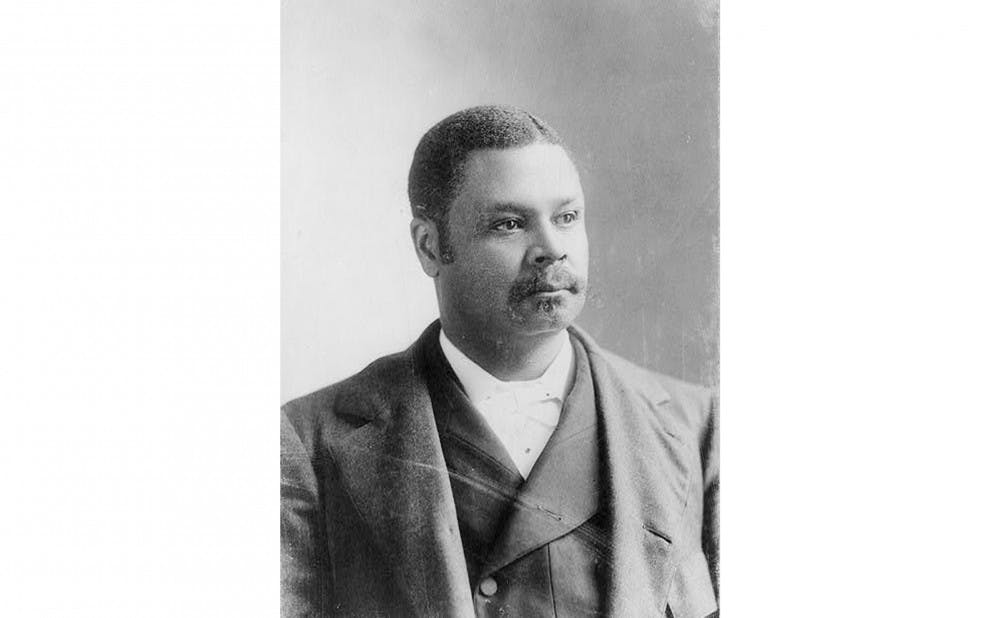A banquet on Duke's campus Friday evening honored the legacy of George Henry White, the last black representative in Congress at the turn of the 20th century.
The event commemorated the 115th anniversary of White's farewell speech to Congress—during which he said black representatives were bidding a "temporary farewell to the American Congress," but said black leaders would rise again in U.S. government, like the rise of a phoenix. Local leaders, including Durham Mayor Bill Bell and former North Carolina Reps. Eva Clayton and Frank Ballance attended the banquet, which was hosted by organizations including the Benjamin & Edith Spaulding Descendants Foundation, Inc., the George Henry White Bar Association, Inc. and the Phoenix Historical Society. The event took place at the Searle Center on Duke's medical campus.
White, who was born in Bladen County, N.C., in 1852, attended Howard University and became a lawyer in 1879. His political career began at the state level, and he was elected to the House of Representatives in 1897.
Many speakers at the banquet highlighted White’s various successes in public life, including his time in Washington.
“He wasn't talking about dismantling Wall Street, like we are hearing today in the political debate," Rep. G. K. Butterfield, chair of the Congressional Black Caucus, said. "He was talking about an anti-lynching law, that's how radical this was. He just wanted it make it a federal crime to lynch somebody...he wanted social equality, civil rights.”
White’s career in Washington proved to be short-lived. After his election election in 1897, the Democratic Party ran on a campaign of white supremacy. Led by Furnifold McLendel Simmons and Josephus Daniels, publisher of The Raleigh News & Observer, it took control of the North Carolina state legislature in 1898. Democrats then proceeded to pass measures restricting access to the ballot for black citizens, making it difficult for White to win another term. In 1901, White was voted out of office.
Stephen Spaulding, steering committee member of the BESPDF, spoke about White's his farewell speech, which was delivered on the floor of the House of Representatives Jan. 29, 1901.
“He wanted to highlight the elimination of black representation in U.S. Constitution in this speech,” Spaulding. “It ended African-American participation in our nation's capital in 1901. He wanted to remind them of the reasons he was defeated and it was very shaky reasons.”
It would be 28 years before another black representative, Oscar De Priest of Illinois, would be elected to Congress.
Reverend Michelle Laws of the North Carolina chapter of the National Association for the Advancement of Colored People, and Antoinette Burwell, president of the George Henry White Bar Association, said White’s struggle against restrictive voting laws resembles the current fight for against new laws governing voting in North Carolina.
"[White's] presence looms over North Carolina in a deeply prophetic way concerning the suppression of voting rights," said Laws. "I stand here in the shadow of a pending court decision, as we are still battling for our sacred right to vote."
The North Carolina General Assembly passed legislation in 2013 that required photo identification to vote, shortened the early voting period by a week, removed same-day registration, eliminated the ability for 16- and 17-year-olds to pre-register, among other provisions. Many organizations, including the state's chapter of the NAACP, claim that these requirements heavily restrict minorities and have pursued legal action against the state. The NAACP has filed a lawsuit against the state and this legislation.
“Rest assured not that we as individuals participate in that vote, but that we get everybody to participate in the vote,” said Milton Fitch, Jr. of the North Carolina Grand Lodge of Prince Hall Masons. “Out of the ashes, like a phoenix, George White challenges us to do that very thing. Men and women have died for that right. Do not let them have died in vain.”
Rev. Robert Johnson, pastor of Ebenezer Presbyterian Church, spoke in his invocation about the impact of White’s legacy on minority representation and the advancement of African Americans.
"George White simulated us," said Burwell. "Today, he stimulates us. Hopefully, we learn from his history."
Get The Chronicle straight to your inbox
Signup for our weekly newsletter. Cancel at any time.
Class of 2019
Editor-in-chief 2017-18,
Local and national news department head 2016-17
Born in Hyderabad, India, Likhitha Butchireddygari moved to Baltimore at a young age. She is pursuing a Program II major entitled "Digital Democracy and Data" about the future of the American democracy.

